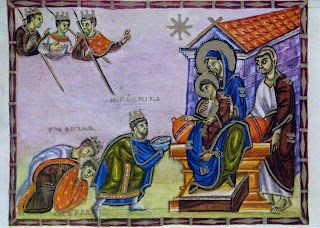4th Epiphany
Matthew 8: 1 – 13
When Jesus came down from the mountainside, large crowds followed him. A man with leprosy came and knelt before him and said, “Lord, if you are willing, you can make me clean.”
Jesus reached out his hand and touched the man. “I am willing,” he said. “Be clean!” Immediately he was cleansed of his leprosy. Then Jesus said to him, “Take care that you speak to no one about this. But go, show yourself to the priests. Make the gift of offering that Moses prescribes, as a proof to them.”
When Jesus had entered Capernaum, a Roman officer, a centurion came to him, asking for help. “Lord,” he said, “my boy lies at home paralyzed, suffering terribly.”
Jesus said to him, “I will come and heal him.”
The centurion replied, “Lord, I am not worthy to have you come under my roof. Speak just one word, and my boy will be healed. For I myself am a man with people above me, and with soldiers under me. If I tell this one, ‘Go,’ he goes; and to another, ‘Come,’ and he comes. I say to my servant, ‘Do this,’ and he does it.”
When Jesus heard this, he was amazed and said to those following him, “Truly I tell you, I have not found anyone in Israel with such great faith. I say to you that many will come from the east and the west, and will take their places at the feast with Abraham, Isaac, and Jacob in the kingdom of heaven. But the sons of the kingdom will be thrown outside, into the darkness of external existence where human beings live, wailing and grinding their teeth.”
Then Jesus said to the centurion, “Go now! According to your faith, so let it be.” And in that same hour, the boy was healed.
4th Epiphany
January 27, 2019
Matthew 8: 1-13
These two human beings, the leper and the centurion, show us different sides of the ideal human relationship with Christ.
With the leper, the desire for his own healing is balanced by an implicit and humble acceptance of God’s will. “If you are willing,” he says. And the Son of God answers, “I am willing.”
God is always willing to heal. But healing is not the same as a cure. Conditions need to be met from the human side—then healing is possible, even when no cure can be found. Perhaps, in this case, the man’s humility, his awareness that his own desires were not necessarily sufficient reason for a cure, was what was necessary for both a healing and a cure.
With the centurion, too, there is humility. Now it is coming from someone who is not only himself in a position of power, but also from one who is asking on behalf of someone else. The centurion recognizes a power stronger than his own, one that transcends time and space. It is evidently his implicit and full trust in that higher power which allows his request to be fulfilled.
Christ himself lives both sides, the active healing side, and the receptive,
suffering side. God, in a human body, was learning about human prayer from those he encountered. And their attitudes of soul he would elevate to a kind of perfection in the garden of Gethsemane. There, he was no longer able to keep body and soul together. He was dying. And he asked his Father for a cure, for just one more day, in order to fulfill what he understood to be his mission to die on the cross the next day. “If this cup of death can pass from me today—if it can wait until tomorrow—but—whatever is fitting, according to your will.”
 |
| Gethsemane, Karl Bloch |
He is our greatest example. “Lord,” we can say, “my trust in you provides the connection through which healing can flow from you. My awareness of the laws of destiny lets me know that in all humility, I am perhaps not the best judge of what I, what others, what the world needs. Only if the requirements of destiny have been fulfilled will a cure be possible. But whatever happens, nonetheless you heal, you make whole. Your will be done.”






















